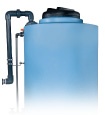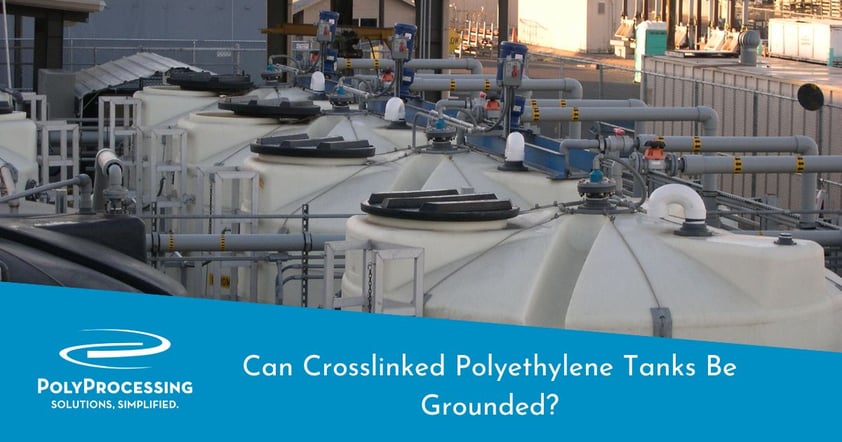Can Crosslinked Polyethylene Tanks Be Grounded?
When storing flammable chemicals, it’s important to follow proper safety protocols to protect your equipment and your personnel. In light of these precautions, Poly Processing customers sometimes ask us about how to ground our chemical storage tanks. They want to ensure that no chemicals or vapors ignite if there’s a spark.
In the case of Poly Processing tanks, no grounding is necessary — and in fact, they can’t be grounded. Let’s unpack why that’s the case.
Why Poly Tanks Can’t Be Grounded
Poly Processing tanks are made of crosslinked polyethylene (XLPE), which is a non-conducting plastic. In fact, many power cords, grounding wires, and plugs are wrapped in xlpe polyethylene. You can't ground a plastic tank because plastic is itself an insulator. Only metal tanks can be grounded.
Grounding is the process of creating a conductive path between a tank or container and the earth. Grounding is commonly used in industries that deal with flammable or volatile substances to prevent static electricity from building up and igniting a fire or causing an explosion.
Plastic tanks don't allow electricity to pass through them easily. Unlike metal tanks, which can be grounded by attaching a conductive wire to the tank and connecting it to an earth ground, grounding a plastic tank would have no effect because the charge would not travel through the tank and into the ground.
Preventing Static Electricity Buildup in Plastic Tanks
XLPE plastic tanks can be susceptible to the hazards of static buildup. Even though flammable liquids with low flashpoints and heavier than air vapors should never be storedHowever, that doesn't mean that safety protocols should be ignored. To reduce the risk of static build-up with a polyethylene tank, operators should handle the contents carefully, grounding nearby metallic objects and avoiding using plastics that have the potential to generate static electricity through contact or friction.
There are a couple of basic anti-static measures that we recommend as part of your PM program:
- Add a humidifier or other source of humidity to the room.
- Spray wash your chemical storage tank with water or anti-static spray.
- Implement procedures that prevent anything from coming near the tank wall (static needs a grounded object to jump to).
Another consideration is the chemical’s flashpoint. A low flashpoint means that it takes less of a spark to ignite the chemical. For example, methyl ethyl ketones are flammable, and it doesn’t take much of a spark to ignite them. Any kind of static buildup can be hazardous. If you don’t store these products properly in a grounded containment unit, you can have serious problems.
Because an XLPE tank can experience some static buildup but can’t be grounded, it’s important not to store low-flashpoint chemicals in a plastic storage system.
At Poly Processing, we always consider the flashpoint of the chemicals that our customers are storing. If the flashpoint is below a certain threshold, then the chemical is not approved to be stored in a PPC tank and we recommend using a properly designed and constructed tank that can be grounded. As general rule most flammable liquids with low flashpoints and heavier than air vapors should only be stored in tanks made from steel or other conductive materials that can be effectively earth grounded. Poly Processing Company strongly recommends that you purchase a properly designed and built chemical storage system for your specific application when purchasing a bulk tank.
For more information about safely designing a chemical storage solution for your specific applications, talk to one of our tank specialists.
- July 10, 2023
- Topics: Value Added
About Poly Processing
Posts By Topic
Tech Talk Podcast Episodes
Subscribe By Email
Recent Posts
- Ferric Chloride Storage: What Operators Need to Know Before Choosing a Tank
- Wastewater Treatment: Modern Approaches to Sludge Removal & Chemical Management
- Why Cycling Causes Tank Failure: Tips for Prolonging Tank Life
- Small Changes in Tank Selection for Big Long-Term Cost Benefits
- NSF Certification vs. FDA Compliance: Understanding Chemical Tank Standards
Tank Configurator

Find the recommended tank and system components for your chemical storage challenge.
Configure a Tank Package



